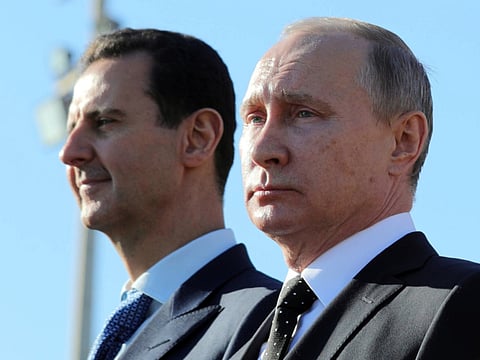Russia must choose between saving Assad and saving Syria
Damascus will continue to bleed and suffer unless a political settlement is reached

Also In This Package
Against predictions by many Syria observers the high-level visit to Damascus on Monday by a Russian delegation led by Deputy Prime Minister Yuri Borisov and Minister of Foreign Affairs Sergey Lavrov did not present President Bashar Assad with a road map to finding a political solution to the country’s nine-year ordeal.
The delegation included political, military and economic officials and the short visit comes at a time when the Syrian economy is in freefall.
Instead, it appears that the two sides focused mainly on ways to increase Russian investments in Syria in a bid to challenge US sanctions; namely the Caesar Act, which went into effect last June.
Only then and under a new constitution can rebuilding begin. And there has to be accountability for the hundreds of thousands of killings that took place during the civil war. In addition, foreign troops and militias must leave Syria at one point and Russia’s military presence will have to be renegotiated by a new freely elected leadershipOsama Al Sharif
President Assad was quoted as saying that he wanted to expand business ties with Russia. According to local media the two sides plan to boost trade ties and will review energy, mining and power projects.
In a press conference Lavrov, who was on his first visit to the Syrian capital in eight years, said that Syria needed international help to rebuild its economy.
There was little mention of the stalled work of the Constitutional Committee, which concluded a third round of talks last month with no progress.
Russia’s military intervention in Syria in 2015 has helped Assad turn the tide and recapture about 80 percent of territories that were under the control of various rebel groups. In return Moscow was rewarded with an airbase and a naval base and recently it was revealed that Assad had given the Russians additional maritime access.
But Russia is not alone in Syria, even though it has the most leverage over the Assad.
Turkish interference in Syria
Turkey, which played a controversial role in aiding and enabling extremists, both foreign and domestic, has a strategic foothold along Syria’s northern borders and has created a buffer zone that extends east of the Euphrates into Syrian Kurdish areas. It continues to support extremist groups in the rebel held province of Idlib.
President Vladimir Putin was able to convince his Turkish counterpart, Recep Tayyip Erdogan, to run joint patrols in parts of northern Syria.
Iranian backed militias, including Hezbollah, are also active in and around Damascus and Israel has been consistent in targeting arms depots and personnel with Moscow looking the other way.
And the United States has moved troops into the oil-rich northeast close to areas under the control of the Syrian Democratic Forces (SDF), a secular alliance led by Syrian Kurds that wants self-rule.
While the fighting has stopped on almost all fronts there is currently a stalemate with the Syria failing to “liberate” Idlib or force US and Turkish troops out.
Lavrov has said that Russia and Turkey do not want a repeat of the Iraq scenario in Syria. But in reality the Syrian situation is relatively much worse. More than 6.2 million Syrians have been internally displaced with an additional 5.6 million taking refuge elsewhere.
There are tens of thousands of Syrians in prisons; a large number of which have been listed as missing. Allegations of massacres and extrajudicial executions are yet to be investigated.
Entire cities and towns have been partially or completely destroyed. With a total of 35,691 damaged structures, Aleppo, Syria’s economic hub and second largest city, comes first in terms of damage count. It has been estimated that rebuilding the country would cost somewhere in the neighborhood of $200 billion.
Rebuilding Syria is a huge task
But regardless of the effect of the Caesar Act, Russia alone cannot lead the mission of rebuilding Syria. And without a change, through a peaceful political process, as indicated in UN Security Council resolution 2254 of 2015, no international funds will be allocated for rebuilding.
Russia has backed political initiatives through the Astana and Sochi processes but it has failed to put real pressure on Assad to produce results through national dialogue and the Constitutional Committee. Instead, Syria now says that presidential elections will be held next year even if the committee has not produced a new constitution.
The reality is Syria will continue to bleed and suffer unless a political settlement is reached; one that triggers a long process of national healing.
Only then and under a new constitution can rebuilding begin. And there has to be accountability for the hundreds of thousands of killings that took place during the civil war. In addition, foreign troops and militias must leave Syria at one point and Russia’s military presence will have to be renegotiated by a new freely elected leadership.
Moscow must choose between preserving Assad who has lost credibility, committed atrocities and is wasting time in endless and futile negotiations and between saving Syria and its territorial unity and sovereignty.
The latest Russian visit may have shown solidarity with Assad but it is unlikely to stop the slow collapse of the economy.
Osama Al Sharif is a journalist and political commentator based in Amman.







